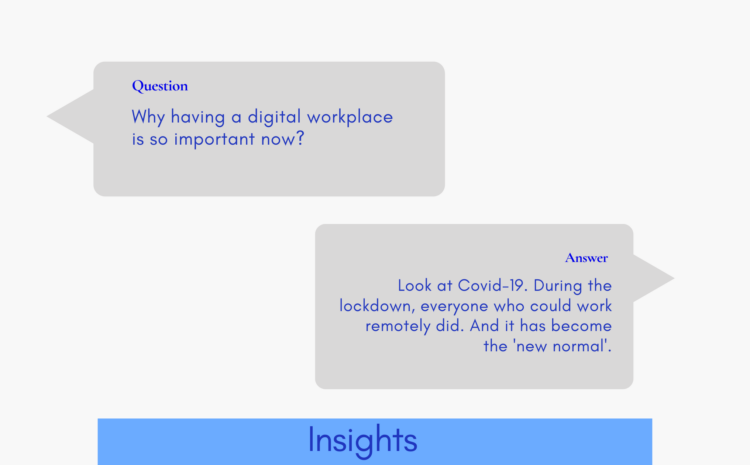
This is actually a very good question.
In 2019, Gartner predicted that by 2024 in-person meetings will drop from 60% of enterprise meetings to 25%, driven by remote work and changing workforce demographics.
It’s supposed to be 4 years of ‘change’ to a new normal. But then, let’s go back to 2020, when Covid-19 disrupted almost everything. When lockdowns were imposed, everyone who could work remotely, did. Industries and companies that thought they weren’t able to function digitally discovered that they, in fact, could.
The 4 years prediction about digital workplace evolution happened in about 30 days!
With the recent COVID-19 pandemic, having a digital workplace has become more important than ever. A digital workplace provides increased flexibility for both employers and employees, which is especially beneficial when people cannot physically be in the same office space. It also eliminates the need for a physical office and allows employees to work from anywhere at any time. Better collaboration is also seen between teams and this will later help reduce the cost of operations.
With improved communication tools, businesses can better manage their resources and stay connected with their customers and partners. Furthermore, it allows them to track team performance more easily, enabling better decision-making.
Do people want to go back to the older ways of working?
To be in the office every day 9-5?
To be stuck in traffic?
NO!!
So yeah, that is why a digital workplace is important now. Today more than ever, the digital workplace is not a nice-to-have, but a must-have. Businesses that can successfully evolve will see happier employees, increased productivity, and long-term growth.
It’s likely that the trend toward digital workplaces will continue in the future. The COVID-19 pandemic has accelerated the shift to remote work and has highlighted the importance of having a digital infrastructure in place. As a result, many companies have implemented or expanded their digital workplace offerings.
The future of digital workplaces is likely to involve more advanced technologies such as virtual and augmented reality, as well as AI-powered tools to improve collaboration and productivity. Remote work will likely continue to grow in popularity and be a norm, and the need for digital infrastructure to support it will continue.
Overall, I predict that the digital workplace will continue to evolve and improve, becoming an even more integral part of how we work. Companies that adopt and invest in digital technologies will have a competitive advantage in the future.





